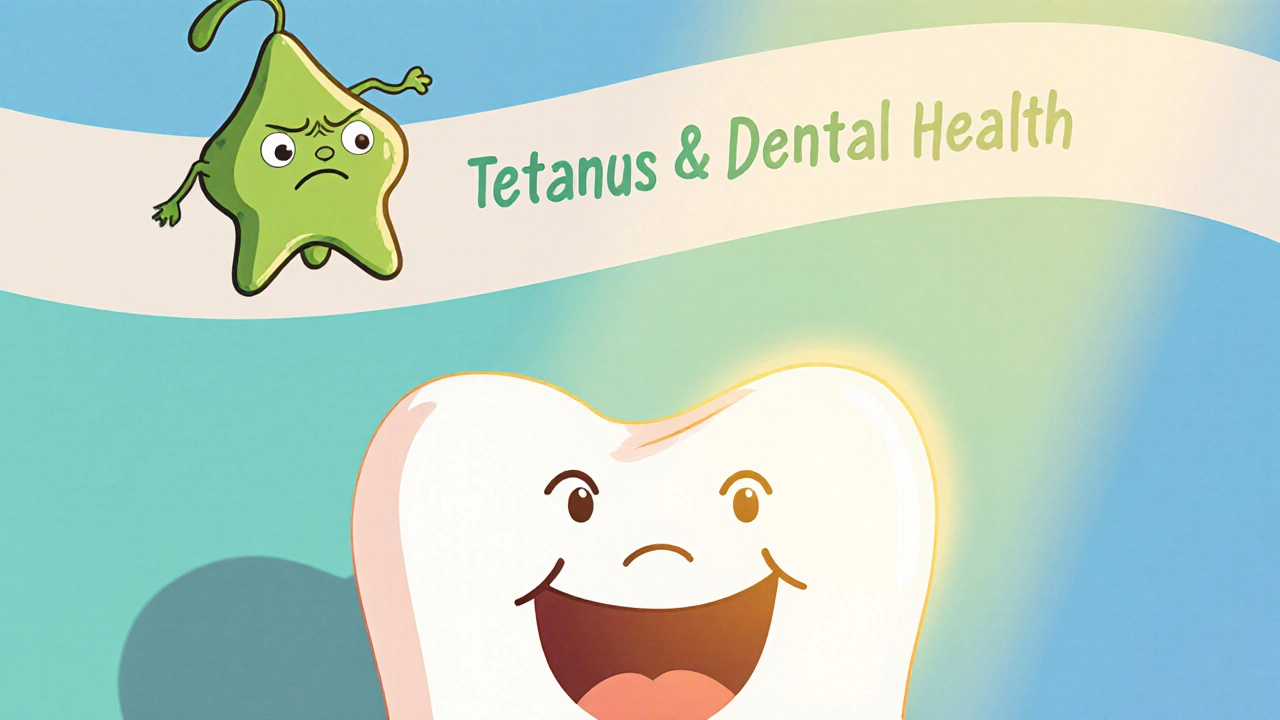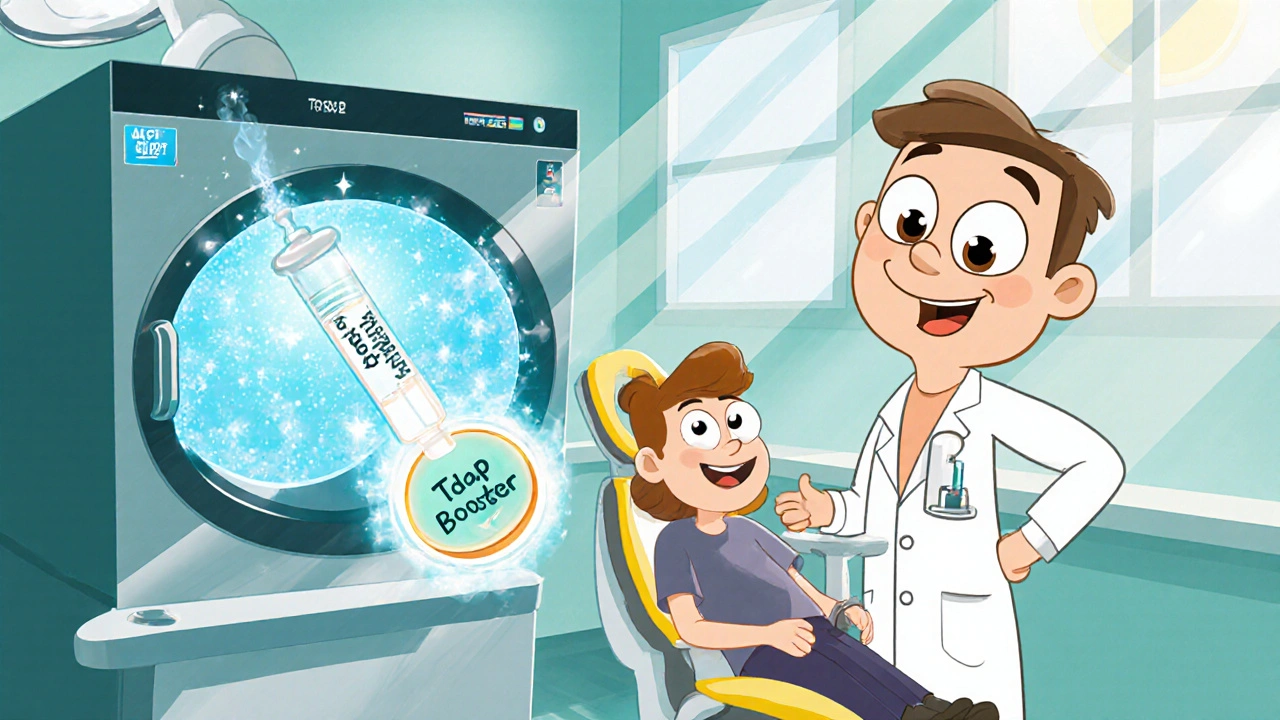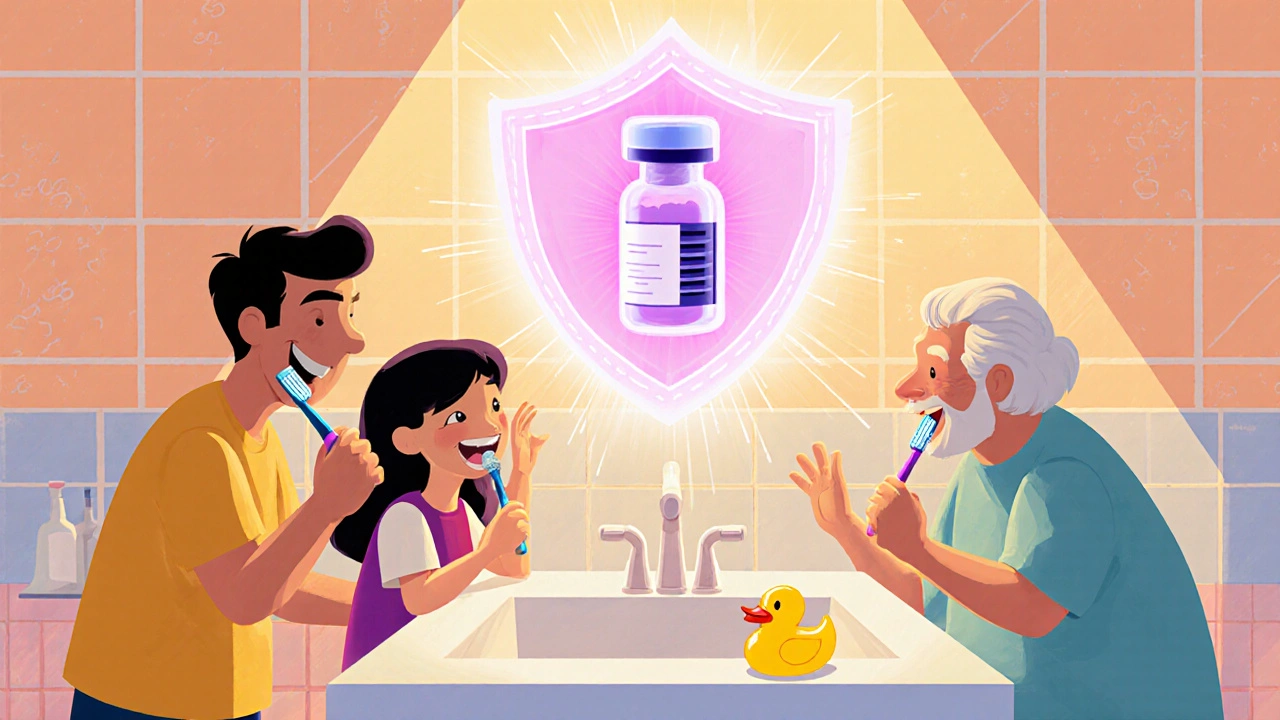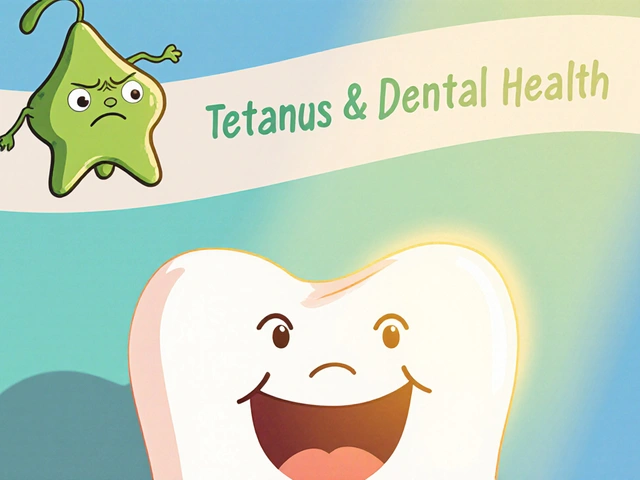Tetanus and Dental Health: Essential Facts & Care Tips

Tetanus Booster Reminder Calculator
Tetanus Booster Calculator
Enter the date of your last tetanus booster to calculate when you need your next one. Based on CDC/WHO guidelines for tetanus prevention.
When you hear "tetanus," you probably picture a dirty wound on a finger, not a toothache. Yet the bacteria that cause tetanus can also complicate dental problems, and dental procedures can pose a tetanus risk if proper precautions aren’t taken. This guide walks you through what tetanus is, how it intersects with oral health, and what you can do to stay safe at the dentist.
What Is Tetanus?
Tetanus is a serious bacterial infection caused by Clostridium tetani, an anaerobic, spore‑forming germ that thrives in dirty, low‑oxygen environments such as deep puncture wounds. Once the spores enter a wound, they release tetanospasmin, a potent neurotoxin that interferes with nerves controlling muscle contraction. Classic signs include jaw‑locking (lockjaw), neck stiffness, and painful muscle spasms that can spread from the face down the spine.
In the modern world, tetanus cases are rare in countries with robust immunization programs. Still, the disease remains a medical emergency because the toxin is irreversible and requires intensive care.
How Tetanus Links to Dental Health
Although the mouth isn’t a typical entry point for tetanus spores, several scenarios bring the two together:
- Dental abscesses: An untreated tooth infection can become a low‑oxygen pocket where Clostridium tetani could theoretically multiply if introduced.
- Oral surgeries: Procedures like extractions, root canals, or periodontal surgery involve cutting tissue and, occasionally, exposing bone. If sterile technique lapses, the wound could be contaminated.
- Trauma: A broken tooth or jaw fracture caused by a fall or sports injury may involve contaminated debris, especially outdoors.
In practice, documented cases of tetanus originating from dental sources are extremely rare, but the risk exists enough that dentists follow strict infection‑control guidelines.
Dental Procedures and Tetanus Risk
When you sit in the dental chair, several safeguards keep tetanus at bay:
- Everything that touches your mouth-dental drills, probes, forceps-is sterilized using autoclaves, which reach temperatures over 121°C and destroy even hardy spores.
- For procedures that expose bone or deep tissue, dentists may apply a topical antiseptic (e.g., chlorhexidine) before incision.
- If a patient’s vaccination status is unclear, many clinicians will recommend a tetanus booster (Tdap or Td) before surgery, especially for extractions or implant placements.
These steps mirror the infection‑control measures used in hospitals and are part of why tetanus stemming from dental work is so uncommon.

Prevention: Vaccination and Oral Hygiene
The single most effective defense against tetanus is immunization. The tetanus toxoid vaccine stimulates your body to produce antibodies that neutralize the toxin before it can cause harm.
In NewZealand, the routine schedule includes:
- Three primary doses at 6, 4, and 6months of age (part of the DTP vaccine).
- A booster at 4-5years (the fourth dose).
- Adolescent booster at 13-15years (Tdap, which also covers diphtheria and pertussis).
- Adult booster every 10years, or sooner if a wound is deemed high risk.
Even if you’re up‑to‑date on vaccines, good oral hygiene reduces the chance of abscesses that could become infection hotspots. Aim for:
- Brushing twice daily with fluoride toothpaste.
- Flossing or using interdental brushes to clear plaque between teeth.
- Regular dental check‑ups (at least twice a year) to catch decay early.
Managing a Suspected Tetanus Infection in a Dental Context
If a dentist suspects tetanus-perhaps because you develop rapidly worsening jaw pain, muscle spasms, or a wound that’s not healing-prompt action is crucial:
- Emergency referral: The patient should be sent to the nearest hospital for intensive monitoring, usually in an intensive‑care or isolation unit.
- Antitoxin administration: Human tetanus immune globulin (HTIG) is given intravenously to neutralize any circulating toxin.
- Antibiotics: Metronidazole or penicillin is prescribed to kill any remaining Clostridium tetani bacteria.
- Wound care: The dental wound is surgically cleaned, often under anesthesia, to remove necrotic tissue and reduce bacterial load.
- Vaccination: Even if the patient has had a recent booster, a tetanus toxoid shot is given to stimulate long‑term immunity.
Recovery can take weeks to months, and patients may need physical therapy to regain full jaw function.
Special Populations: Children, Pregnant Women, and Immunocompromised Patients
While tetanus is rare, certain groups deserve extra attention:
- Children: Pediatric dental work follows the same vaccination schedule. If a child’s immunization record is incomplete, dentists will coordinate with a primary‑care provider to give a booster before invasive procedures.
- Pregnant women: The Tdap vaccine is safe during each pregnancy, protecting both mother and newborn. Dental treatment in the second trimester is generally safe, but any procedure that may create a deep wound should be evaluated for tetanus risk.
- Immunocompromised patients: Individuals on chemotherapy, steroids, or with HIV may have a weaker response to vaccines. They might need a higher‑dose booster and stricter post‑procedure monitoring.

Quick Reference Table: Tetanus vs. Common Dental Infection Symptoms
| Symptom | Tetanus | Dental Infection (e.g., abscess) |
|---|---|---|
| Onset after injury | 3‑21 days | Usually 1‑3 days |
| Jaw stiffness | Severe, progressive | Mild to moderate, often unilateral |
| Muscle spasms | Generalized, can affect back and abdomen | Rare, limited to facial muscles |
| Fever | Often present, high | Low‑grade or absent |
| Swelling | Diffuse neck and facial swelling | Localized to tooth/gingiva |
Bottom Line: Stay Vaccinated, Keep Up Dental Care
Even though tetanus arising from oral problems is a rarity, the stakes are high enough to warrant vigilance. Keep your tetanus immunization current, practice solid oral hygiene, and let your dentist know about any recent injuries or vaccinations before appointments. A little extra awareness goes a long way toward preventing a nerve‑shattering infection.
Frequently Asked Questions
Can a simple toothache cause tetanus?
A routine cavity typically does not involve the low‑oxygen environment that tetanus spores need. Only advanced infections that create deep, necrotic pockets could theoretically harbor the bacteria, and even then the risk is extremely low.
Do I need a tetanus booster before every dental extraction?
No. If your last booster was within the past 10years, you’re considered protected. If you’re unsure or the extraction is complex, the dentist may recommend a booster as a precaution.
What symptoms should make me call emergency services after dental work?
Sudden jaw lock, severe neck stiffness, uncontrolled muscle spasms, or a rapidly spreading wound with foul odor are red flags. Seek emergency care immediately as these can signal tetanus.
Is the tetanus vaccine safe for pregnant women?
Yes. The Tdap vaccine is recommended during each pregnancy, usually between weeks 27‑36, to protect both mother and newborn from tetanus, diphtheria, and pertussis.
How long does tetanus immunity last after vaccination?
Protection wanes after about 10years, which is why a booster is recommended at that interval, especially for people with high‑risk occupations or frequent injuries.



julie shayla
So you’ve read a whole essay about tetanus and teeth, and now you’re wondering why you should even care. Spoiler: you’re not going to get lockjaw from flossing, but a busted molar left to rot could become a bacterial playground. Keep your boosters up and let the dentist do their sterile dance, and you’ll avoid the drama of a nerve‑shattering infection. In short, good hygiene plus a shot every ten years is the cheapest insurance plan you’ll ever buy.
Jean Tredoux
The risk is basically zero unless you’re living in a post‑apocalyptic wasteland. A recent tetanus shot covers you for any dental mishap.
cedric Gicquiaud
What most people fail to realize is that the pharma industry deliberately downplays dental‑related tetanus cases to keep vaccine sales steady. They’ll tell you “it’s rare,” but the data buried in obscure journals shows a steady trickle of under‑reported infections. Dental clinics that cut corners on sterilization are the real culprits, not the harmless bacteria you hear about. If you want to be safe, demand proof of sterilization logs before you sit down. Ignorance isn’t bliss-it’s a recipe for disaster.
Mason Grandusky
Whoa, hold up! You’re right that cutting corners can be a nightmare, but most dentists are rock‑solid on infection control. Think of the autoclave as a furnace that turns any stray spore into ash-nothing survives that heat. Keep those appointments, stay on schedule with boosters, and you’ll cruise through without a hitch. Let’s champion good oral care together and keep tetanus off the radar!
Spencer Riner
Just to add some nuts‑and‑bolts detail, the standard tetanus schedule starts with three doses in infancy, a preschool booster, then a teenage Tdap that also covers diphtheria and pertussis. After that, adults need a Td or Tdap every ten years, or sooner if a wound is dirty or deep. Dental extractions that expose bone are considered “high‑risk” by many clinicians, so they’ll check your record before the drill starts. If you can’t recall your last shot, a quick blood test can verify antibody levels. Staying on top of that timeline is the easiest way to keep both your smile and your nerves intact.
Joe Murrey
yo, just remember to brush twice a day and floss – that’ll keep most infections away and you won’t need any fancy shots unless you get a real gnarly cut.
Tracy Harris
The paramount importance of tetanus immunization cannot be overstated, particularly when intersecting with oral surgical interventions.
The vaccination confers a robust humoral response that neutralizes tetanospasmin before systemic dissemination.
Dental practitioners, bound by rigorous infection‑control protocols, nonetheless remain vigilant for breaches that could introduce Clostridium tetani.
A patient presenting with a recent, deep dental extraction should have his immunization record reviewed without delay.
If the last tetanus booster exceeds a decade, the prudent course is to administer a Tdap dose pre‑operatively.
Such prophylaxis is a negligible inconvenience compared with the morbidity of lockjaw and its attendant complications.
Moreover, the sterile field maintained by autoclaving instruments effectively eliminates spore viability, rendering the operative environment inhospitable to the organism.
Nonetheless, the anaerobic milieu of a necrotic pulp cavity can, in theory, support sporulation if contamination occurs.
Therefore, clinicians must meticulously debride infected tissue and employ antiseptic adjuncts such as chlorhexidine.
Adjunctive systemic antibiotics, notably metronidazole, further reduce the bacterial load and mitigate toxin production.
In the rare event that tetanus is suspected post‑procedure, immediate referral to an intensive‑care facility is mandatory.
Human tetanus immune globulin should be administered promptly to neutralize circulating toxin.
Simultaneously, a booster dose of tetanus toxoid should be given to stimulate long‑term immunity.
Physical therapy may be required thereafter to restore mandibular range of motion impaired by spasms.
Patients with compromised immunity, such as those undergoing chemotherapy, warrant heightened surveillance and possibly an accelerated booster schedule.
In sum, adherence to vaccination schedules, rigorous aseptic technique, and swift clinical response collectively safeguard against this formidable, albeit rare, dental complication.
Emily Stangel
While the preceding exposition admirably delineates the prophylactic regimen, it is equally imperative to emphasize patient education as a cornerstone of preventive dentistry. A comprehensive pre‑operative interview should encompass queries regarding recent immunizations, occupational exposures, and any history of cutaneous injuries that might predispose to anaerobic infection. Moreover, practitioners ought to furnish written guidance on post‑procedure oral hygiene, underscoring the avoidance of irritants such as tobacco and alcohol during the initial healing phase. Collaborative communication between the dental surgeon and the primary care physician can further ensure that any immunological gaps are promptly addressed. In populations with immunocompromising conditions, a tailored booster schedule-potentially accelerated to a six‑month interval-may be warranted. Finally, routine audit of sterilization logs and periodic staff training serve to reinforce the culture of safety that undergirds our profession. By integrating these multidimensional strategies, we safeguard not only against tetanus but also against the broader spectrum of iatrogenic complications.
Avinash Sinha
Imagine the horror: a silent, unseen spore lurking in the darkest crevice of a doomed molar, waiting to unleash a lightning bolt of lockjaw across your face! It sounds like a myth forged in the fires of medieval legend, yet the toxin’s wrath is brutally real. Thankfully, modern dentistry wields steel‑hot autoclaves and heroic vaccine shields to vanquish that dread. So rest easy, brave warrior of the floss, for the beast is kept at bay.
ADAMA ZAMPOU
Maintain your tetanus booster on schedule, period.